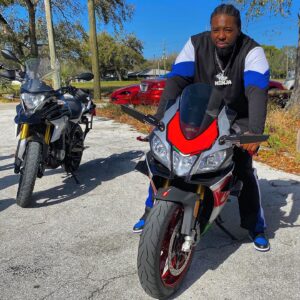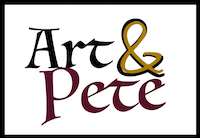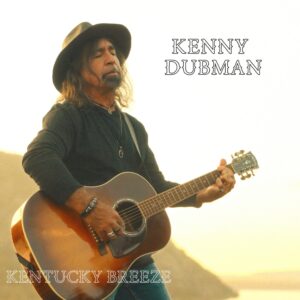
SACRAMENTO, CA – OCTOBER 13: Drummer Aaron Gillespie of Underoath performs at Aftershock Festival 2018 at Discovery Park on October 13, 2018 in Sacramento, California. (Photo by Miikka Skaffari/FilmMagic)
FilmMagic
Aaron Gillespie is man of numerous talents and renown musical endeavors. Gillespie’s most famed work pertains to drumming and singing in the grammy nominated rock group, Underoath. The band was a culture phenomenon in the early to mid 2000’s with their blend of emo and harsh metallic instrumentation, and with their 2018 album, Erase Me, Underoath has seen an incredible comeback from both their fanbase and critical reception; their 2018 record received a Grammy nomination for Best Metal Performance. While Underoath is a core component to Aaron’s career, his other project, The Almost, showcases his multi-instrumental talents, but also his admiration for melodic rock and classic songwriters like U2, Tom Petty, and Bruce Springsteen. With The Almost’s latest record, Fear Caller, Aaron doubles down on these aspects, and gives listeners his thunderous and lively take on U2’s “In God’s Country.” Getting the chance to speak with Aaron, he discusses why he chose the desert as main source of inspiration for this record, and among other things, why he chose to part Christianity from The Almost and Underoath brands.
What has the anticipation been like for The Almost’s upcoming record, Fear Caller? It’s the project’s first record with Fearless Records, how did Fearless come into the picture?
[Underoath] signed to Fearless when we did our comeback record, which came out last year. When we signed to Fearless we felt after all those years it was time to make a change, and it was just a great fit and we love the people there. At the end of last year [The Almost] was on tour with Underoath, and the first time around when I did this a decade ago, I just had these songs that had to happen, it didn’t really fit the Underoath format. For a creative a person it’s so unhealthy to have one outlet, if you’re like “I’m a painter and I’m going to work on one painting until I die,” it’s just not reality. It’s songs that don’t fit the Underoath format, and I just had this burning creative bomb happen, and I really wanted to make songs. I write songs for a lot of different people, guys that make electronic music, pop music, etc. and I just came home from this tour at the end of the year last year and I started making songs. I have a studio less than mile from my place that I go to every morning when I’m inspired, and it kind of doubled as my drum practice unit, I call it my creative hole. I started writing all these songs and out of no where I just was like, “I feel like this is that kind of confessional really honest thing that I had going years ago when I did The Almost brand, maybe I should resurrect that brand?” It had never properly been put to bed, I just stopped doing it for the time I was playing drums for Paramore for 3 or 4 years. I just got super busy, I had a child, and I just sort of put it down. So I called my manager and I was like we should have a conversation about that, and I showed him the songs and people liked the songs. The label liked the songs, management liked the songs, it just happened. Around March or April, I rented a house in Joshua Tree and me my producer buddy, and Matt Squire literally put all of my studio gear in a u-haul van, and we drove to Joshua Tree and made this record.
You state the desert was a main source of inspiration for this record, what about that ecosystem in particular intrigues you or gave you your creative flow?
I just love it there, and I always have. I went on vacation to Palm Springs as any Millennial does, and I asked somebody “hey, I want to go out to the desert.” Palm Springs is in the desert but it’s like houses and the Ace Hotel, and you’re kind of just doing the city thing. So a friend of ours drove us out to Pappy & Harriet’s, which is this bar in pioneer town that was a movie set from the 60’s that they just repurposed as a hotel, it’s really cool it’s and in the middle of nowhere. We drove all out there through the desert, and I said to myself “I need to buy property out here, make a record out here, or both.” To me I think the inspiration and the reason why I love it so much is because I feel like there are certain things that are not our business as humans, like the gestation of a child if you will. My son had all these issues in utero and he’s fine now, hes’ seven and he’s great, but I remember the doctor saying to me “life is god’s business,” and whether or not you believe in god or a deity, or no deity, there are things that aren’t anyone’s business, and I feel like the desert is one of those things. You go out there and there’s stuff happening, like if you go to Joshua Tree national park you can walk for miles or days and the landscape changes and you’ll see different things on the ground. Something is alive, breathing, and happening there but it’s no mans business, it’s no human’s business. I think that’s the most inspiring thing for me about it, and I’m also kind of scared of it. It’s that holy fear thing, where you’re like there’s something happening here, there’s something moving and changing and I have no idea what it is.
In the past, The Almost was labeled as a Christian rock group, or Christian associated act. Do you still consider The Almost to be Christian rock, or a religiously inspired music?
So I grew up in a Christian home, and initially for a long time Underoath was a Christian band, and I wanted to transfer that to The Almost and play that type of music, but as you get older your views change. You go “wait a minute, do I believe in the way this institution is ran?” I definitely have spiritual beliefs but I don’t really believe in organized religion at all anymore. That’s a place that I got to over a lot of deliberation, a lot of thought, and a lot of study. I’m just not religious, and I think that when you say “I’m in a Christian band,” or you even say like “I’m in a vegan band, “ or “I’m in an anything band,” you alienate the other people. I think the scariest thing in our country and the scariest thing in the world is exclusion. I feel like exclusion is so dangerous, and we experience that now as Americans. There’s people and groups in America who experience exclusion. It’s sad and it’s gross, but I feel like music especially should be one of the places you can go to for complete inclusion. You should be able to take something and go “oh this is for me,” or “oh this isn’t for me.” I think that already deciding that before you even put it in the store or put it on Spotify and Apple Music is super dangerous. I don’t think music has a faith, music is music. For me that’s the reason.
From you’re past experience, and being a part of Christian associated bands, how does the interaction between the music business and religious music differentiate from non-religious music and the music business, are they completely different worlds?
They are, they’re completely different worlds. With Underoath we never really toured as a Christian band, we would play some of those festivals, but we always toured with general market artists, and we were always considered by many a general market artist. For some reason that happened and I’m thankful for it, but you could do a whole literary piece about the Christian music industry, and I could tell you things that would blow your mind. It’s just a weird, weird, weird, world and that’s 99% of the reason I got out of it; the people in it and the industry of it all, and the way that they treat other people. There are good people everywhere, but you typically hear about the bad when it comes to these things. It’s wild, upside down, strange, and to be frank, I don’t know that we ever wanted to do a lot of the things we did in Underoath, in terms of the festivals, but it’s like you’re in it so you pay dues back to it. The money inside the Christian music is so much higher so much sooner for artists. It’s really interesting, and when you think about it the Christian industry is all donation based, like when you go to a church and you see a $150,000 sound system, that didn’t just fall out of the sky, that was purchased with contributions. It’s just a world that I don’t want to be associated with that I was for a long time, and the older I got the more I looked at it like “wow, this is really really weird.” But you live and you learn, hindsight always has the best glasses.
Having professional experience not only in the rock world but with pop, electronic, and mainstream genres as well, do you think rock is starting to find a place in mainstream genres like EDM, Rap, Pop etc?
I think that everything genre wise in music is cyclical. I think it just depends on the time and what people want. Right now hip-hop is pop music, and in the 90’s Hootie & The Blowfish was pop music, and then you had like Tupac and Lil’ Kim that became pop music, and then for a while emo music became pop music. It’s all cyclical, and you have a lot of guys these days that are like “man, rock music is dead and I’m pissed,” but it’s just the cycle man. You can’t look at and go “what are we going to do?” I think you just get in and create where ever you fit, and for me I just knew a lot of DJ’s and pop music producers that were fans of that early to mid 2000’s stuff that we started with. It’s been a really cool opportunity for me because I’ve met a lot of these people, I’ve played their festivals, and I’ve written on their songs. It’s all just convergent at that point, and you just wait for the cycle to come around, and you continue to make the music that you want to make. Underoath this summer, we did a Korn and Alice In Chains tour and it was 25,000 tickets a night. You had this feeling when you walked on stage every night like “wow, these two bands haven’t done a ton since the early 2000’s late 90’s, and it’s like nothing ever happened or nothing ever stopped!” I think it’s just a cycle.
The Almost’s new record, Fear Caller, drops Friday October 18th on streaming platforms and is available on online music stores. The band is scheduled to hit the road January 2020 in support of the new record.






